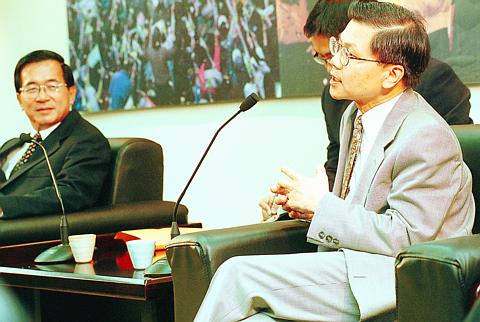After congratulating President-elect Chen Shui-bian (
Chen also said he hoped biotechnology could function "as a bridge between the US, China and Taiwan, and that it could lead to cross-strait peace and common Asia-Pacific interests."
Chen invited Ho, currently on a visit to Taiwan, to assist Taiwan in developing biotechnology.

PHOTO: CHEN CHENG-CHANG, TAIPEI TIMES
Ho, considered good friend of Chen's and a member of Academia Sinica, said: "biotechnology is important to Taiwan, and I am happy to provide an advisory service."
However, Ho said since Chen had not yet made any formal request regarding the appointment, he could not say more for the moment.
Chen said he had recently talked with Academia Sinica president Lee Yuan-tseh (
Chen said Ho and Lee would meet at a later later to talk more about the issue. In addition, Chen said, he would formally invite Ho to take the position of head advisor after the presidential inauguration on May 20.
"I would like to turn Taiwan into a manufacturing and service center for biotechnology," Chen said.
Ho said three conditions are necessary for the development of biotechnology. First, he said, talent was the most important factor.
"A critical mass of talent is required to develop biotechnology," Ho said, adding that there is a lot of overseas and domestic talent in this field.
Secondly, he said the government should get involved in facilities and funding, to show its strong commitment to this goal. And third, he said, private donations were also crucial in ensuring continued funding.
Flashing his trademark boyish smile, Ho emphasized that he visited Chen just to say "hello" and to offer congratulations yesterday.
Chen, however, said he hoped Ho could dedicate himself to his home country in the future.
Ho was born in Taichung in 1952 and left for the US at the age of 12. He returned to Taiwan in 1996 after he was chosen as Time magazine's Man of the Year for 1996, in recognition of his revolutionary work in drug therapies to combat AIDS.

NATIONAL SECURITY THREAT: An official said that Guan Guan’s comments had gone beyond the threshold of free speech, as she advocated for the destruction of the ROC China-born media influencer Guan Guan’s (關關) residency permit has been revoked for repeatedly posting pro-China content that threatens national security, the National Immigration Agency said yesterday. Guan Guan has said many controversial things in her videos posted to Douyin (抖音), including “the red flag will soon be painted all over Taiwan” and “Taiwan is an inseparable part of China,” while expressing hope for expedited “reunification.” The agency received multiple reports alleging that Guan Guan had advocated for armed reunification last year. After investigating, the agency last month issued a notice requiring her to appear and account for her actions. Guan Guan appeared as required,

A Vietnamese migrant worker yesterday won NT$12 million (US$379,627) on a Lunar New Year scratch card in Kaohsiung as part of Taiwan Lottery Co’s (台灣彩券) “NT$12 Million Grand Fortune” (1200萬大吉利) game. The man was the first top-prize winner of the new game launched on Jan. 6 to mark the Lunar New Year. Three Vietnamese migrant workers visited a Taiwan Lottery shop on Xinyue Street in Kaohsiung’s Gangshan District (崗山), a store representative said. The player bought multiple tickets and, after winning nothing, held the final lottery ticket in one hand and rubbed the store’s statue of the Maitreya Buddha’s belly with the other,

‘NATO-PLUS’: ‘Our strategic partners in the Indo-Pacific are facing increasing aggression by the Chinese Communist Party,’ US Representative Rob Wittman said The US House of Representatives on Monday released its version of the Consolidated Appropriations Act, which includes US$1.15 billion to support security cooperation with Taiwan. The omnibus act, covering US$1.2 trillion of spending, allocates US$1 billion for the Taiwan Security Cooperation Initiative, as well as US$150 million for the replacement of defense articles and reimbursement of defense services provided to Taiwan. The fund allocations were based on the US National Defense Authorization Act for fiscal 2026 that was passed by the US Congress last month and authorized up to US$1 billion to the US Defense Security Cooperation Agency in support of the

DAREDEVIL: Honnold said it had always been a dream of his to climb Taipei 101, while a Netflix producer said the skyscraper was ‘a real icon of this country’ US climber Alex Honnold yesterday took on Taiwan’s tallest building, becoming the first person to scale Taipei 101 without a rope, harness or safety net. Hundreds of spectators gathered at the base of the 101-story skyscraper to watch Honnold, 40, embark on his daredevil feat, which was also broadcast live on Netflix. Dressed in a red T-shirt and yellow custom-made climbing shoes, Honnold swiftly moved up the southeast face of the glass and steel building. At one point, he stepped onto a platform midway up to wave down at fans and onlookers who were taking photos. People watching from inside